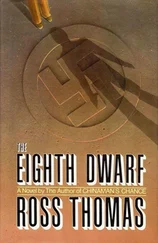Ross Thomas - Missionary Stew
Здесь есть возможность читать онлайн «Ross Thomas - Missionary Stew» весь текст электронной книги совершенно бесплатно (целиком полную версию без сокращений). В некоторых случаях можно слушать аудио, скачать через торрент в формате fb2 и присутствует краткое содержание. Город: New York, Год выпуска: 1983, ISBN: 1983, Издательство: Simon & Schuster, Жанр: Политический детектив, на английском языке. Описание произведения, (предисловие) а так же отзывы посетителей доступны на портале библиотеки ЛибКат.
- Название:Missionary Stew
- Автор:
- Издательство:Simon & Schuster
- Жанр:
- Год:1983
- Город:New York
- ISBN:978-0-671-49363-9
- Рейтинг книги:3 / 5. Голосов: 1
-
Избранное:Добавить в избранное
- Отзывы:
-
Ваша оценка:
- 60
- 1
- 2
- 3
- 4
- 5
Missionary Stew: краткое содержание, описание и аннотация
Предлагаем к чтению аннотацию, описание, краткое содержание или предисловие (зависит от того, что написал сам автор книги «Missionary Stew»). Если вы не нашли необходимую информацию о книге — напишите в комментариях, мы постараемся отыскать её.
Missionary Stew — читать онлайн бесплатно полную книгу (весь текст) целиком
Ниже представлен текст книги, разбитый по страницам. Система сохранения места последней прочитанной страницы, позволяет с удобством читать онлайн бесплатно книгу «Missionary Stew», без необходимости каждый раз заново искать на чём Вы остановились. Поставьте закладку, и сможете в любой момент перейти на страницу, на которой закончили чтение.
Интервал:
Закладка:
Ross Thomas
Missionary Stew
Chapter 1
He flew into Paris, the city of his birth, on a cold wet November afternoon. He flew in from Equatorial Africa wearing green polyester pants, a white T-shirt that posed the suspect question HAVE YOU EATEN YOUR HONEY TODAY? and a machine-knitted cardigan whose color, he had finally decided, was mauve.
The articles of clothing, possibly Oxfam castoffs, had been handed to him out of a green plastic ragbag by Miss Cecily Tettah of Amnesty International, who had apologized neither for their quality nor their fit. The mauve sweater must have belonged to a fat man once — an extremely tall fat man. Morgan Citron was a little over six-one, but the sweater almost reached mid-thigh and fitted his emaciated 142-pound frame like a reversed hospital gown. Still, it was wool and it was warm and Citron no longer cared greatly about his appearance.
It was in a cheap hotel room near the Gare du Nord that Citron had been born forty-one years ago, the son of a dead-broke twenty-year-old American student from Holyoke and a twenty-nine-year-old French army lieutenant who had been killed in May during the fighting at Sedan. Citron’s mother, obsessed with her poverty, had named her son Morgan after a distant cousin who was vaguely connected to the banking family. Citron was born June 14, 1940. It was the same day the Germans rolled into Paris.
Now on that wet, cold November afternoon in 1981, Citron went through customs and immigration at Charles de Gaulle Airport, found a taxi, and settled into its rear seat. When the driver said, “Where to?” Citron replied in French: “Let’s say you have a cousin who lives in the country.”
“Ah. My country cousin. A Breton, of course.”
“He’s coming to Paris.”
“But my cousin is poor.”
“unfortunately.”
“Yet he would like a nice cheap place to stay.”
“He would insist upon it.”
“Then I would direct him to the Seventh Arrondissement, in the Rue Vaneau, Number Forty-two — Le Bon Hotel.”
“I accept your suggestion.”
“You’ve made a wise choice,” the driver said.
When they reached the Peripherique, Citron confided further in the driver. “I have a diamond,” he said.
“A diamond. Well.”
“I wish to sell it.”
“It is yours to sell, of course.”
“Of course.”
“You know anything of diamonds?”
“Almost nothing,” Citron said.
“Still, you have no wish to be cheated.”
“None.”
“Then we shall try Bassou and you will tell him that I sent you. He will give me a commission. A small one. He will also give you a fair price. Low, but fair.”
“Good,” Citron said. “Let’s try Bassou.”
Three days before, Citron had watched in the early-morning African hours, already steaming, as Gaston Bama, the sergeant-warder, brought in and ladled out the famous meal that eventually was to help drive the Emperor-President from his ivory throne.
Bama was then an old man of fifty-three, corpulent, corrupt, and slow-moving, with three chevrons on his sleeve that testified to his rank, the same rank he had held for seventeen years. For nearly all of the past decade he had been chief warder in the section d’etranger of the old prison the French had built back in 1923, long before the country was an empire, or even a republic, and still then only a territory of French Equatorial Africa.
The foreigners’ section was in the small, walled-off east wing of the prison. That November it held not only Morgan Citron, but also four failed smugglers from Cameroon; a handful of self-proclaimed political refugees from Zaire; six Sudanese reputed to be slavers; one mysterious Czech who seldom spoke; and an American of twenty-two from Provo, Utah, who insisted he was a Mormon missionary, although nobody believed him. There were also three rich young Germans from Dusseldorf who had tried to cross Africa on their BMW motorcycles only to break down and run out of money a few miles outside the capital. Because no one had quite known what to do with them, they were clapped into prison and forgotten. The rich young Germans wrote home every week begging for money and UN intervention. Their letters were never mailed.
It was largely because he was bilingual in French and English that Morgan Citron had been elected or perhaps thrust into the position of spokesman for the foreign prisoners. His only other qualification was his gold wrist watch, a costly Rolex, that he had bought in Zurich in 1975 on the advice of a knowledgeable barkeep who felt that gold might be looking up as an investment. Just before the Emperor-President’s secret police had come for him in his room at the InterContinental, Citron had slipped the watch from his left wrist and onto his right ankle beneath his sock.
That had been nearly thirteen months ago. Since then he had traded the gold links in the expansion band one by one to Sergeant Bama for supplementary rations of millet and cassava and fish. Infrequently, no more than once a month, there might also be some red meat. Goat, usually. Elderly goat. Citron shared everything with the other prisoners and consequently was not murdered in his bed.
There had been thirty-six links in the watch’s gold expansion band originally. In thirteen months, Citron had parted with thirty-four of them. He knew that soon he would have to part with the watch itself. With his gold all gone, Citron was confident that his term as spokesman would also end. If not drummed out of office, he would abdicate. Citron was one of those for whom political office had never held any attraction.
Sergeant Bama watched as the skinny young private soldier put the immense black ironstone pot down near the bench on which Citron sat in the shade just outside his cell.
“There,” Sergeant Bama said. “As I promised. Meat.”
Citron sniffed and peered into the pot. “Meat,” he agreed.
“As I promised.”
“What kind of meat?”
“Goat. No, not goat. Four young kids, tender and sweet. Taste, if you like.”
Citron yawned hugely, both to express his indifference and to commence the bargaining. “Last night,” he said, “I could not sleep.”
“I am desolate.”
“The screams.”
“What screams?”
“The ones that prevented me from sleeping.”
“I heard no screams,” Sergeant Bama said and turned to the private soldier. “Did you hear screams in the night? You are young and have sharp ears.”
The private soldier looked away and down. “I heard nothing,” he said and drew a line in the red dirt with a bare toe.
“Then who screamed?” Citron said.
Sergeant Bama smiled. “Perhaps some pederasts with unwilling partners?” He shrugged. “A lovers’ quarrel? Who can say?”
“They went on for half an hour,” Citron said. “The screams.”
“I heard no screams,” Sergeant Bama said indifferently and then frowned. “Do you want the meat? Four kilos.”
“And the price?”
“The watch.”
“You grow not only deaf in your old age, but senile.”
“The watch,” Sergeant Bama said. “I must have it.”
Citron swallowed most of the saliva that had been created by the smell of the meat. “I will give you two links — the last two — provided there’re two kilos of rice to go with the meat.”
“Rice! Rice is very dear. Only the rich eat rice.”
“Two kilos.”
Sergeant Bama scowled. It was as excellent bargain, far better than he had expected. He changed his scowl into a smile of sweet reasonableness. “The watch.”
“No.”
Sergeant Bama turned to the private soldier. “Fetch the rice. Two kilos.”
After the private soldier left, Sergeant Bama squatted down beside the ironstone pot. He dipped his right hand into its lukewarm contents and removed a small piece of meat. He offered the piece to Citron. For a moment, Citron hesitated, then accepted the meat and popped it into his mouth. He chewed slowly, carefully, and then swallowed.
Читать дальшеИнтервал:
Закладка:
Похожие книги на «Missionary Stew»
Представляем Вашему вниманию похожие книги на «Missionary Stew» списком для выбора. Мы отобрали схожую по названию и смыслу литературу в надежде предоставить читателям больше вариантов отыскать новые, интересные, ещё непрочитанные произведения.
Обсуждение, отзывы о книге «Missionary Stew» и просто собственные мнения читателей. Оставьте ваши комментарии, напишите, что Вы думаете о произведении, его смысле или главных героях. Укажите что конкретно понравилось, а что нет, и почему Вы так считаете.












